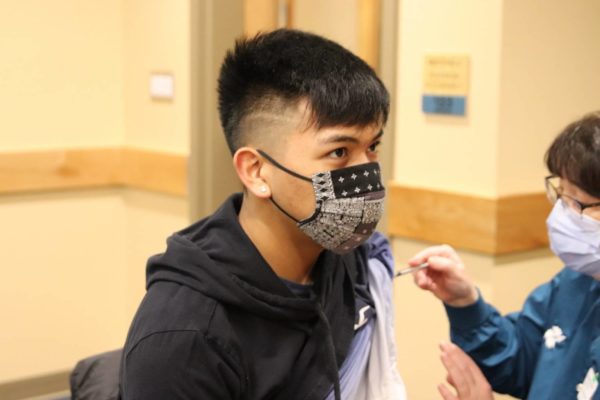
Alaska health officials have officially said children as young as 12 are eligible to receive the Pfizer-Biontech vaccine against COVID-19, after approval by the U.S. Centers for Disease Control and Prevention.
Well before that news broke Wednesday, pediatricians in Alaska have seen intense interest by parents hoping to get their kids vaccinated. One of them is Dr. Michelle Laufer, who’s been pediatrician in Anchorage for over 20 years.
Laufer, with Medical Park Family Care, says it’s been overwhelming to see the negative impacts caused by months of limiting kids’ interactions with their peers. She sees opening up vaccinations for 12- to 15-year-olds as a way to get their development back on track.
Read a full transcript of the interview, edited for clarity.
Dr. Michelle Laufer: Most of what I’m hearing is, ‘When can I get it?’ Many parents are just very excited to have their children vaccinated and feel safer about them doing all the things that kids should be doing: being out socializing, volunteering, playing music, playing sports. Most of what I hear is that there are some questions around the safety of the vaccine, of course, and long-term implications of being vaccinated for COVID, but I would say mostly, it’s just enthusiasm — ‘When can I get it? When will we have it in stock? How can my kid get it?’
Casey Grove: Is there different guidance on how to administer this to children? Or is there any difference in what side effects that we would expect and how common that would be?
Dr. Michelle Laufer: No, it’s the same dose that adults get.
Many vaccines are that way because with vaccines, we use the very smallest amount possible to coax the immune system to create the response we want. In the studies of this age group, 12 to 15, we saw very similar things to with the 16 to 18-year-olds. The most common responses are getting a sore arm. Some people will get a fever and feel a little under the weather for a day or so, especially after the second dose.
RELATED: On first full day of COVID vaccine eligibility, adolescents bare their shoulders
But that’s really a good thing because it is showing your immune system working and responding. So, really, we have seen in the studies and in real life, that side effects of the vaccine are similar in this 12 to 15-year-old age group as they were in older teens and young adults.
Casey Grove: Whether it’s you or the nurses administering the vaccine, how do you feel about having a part in that? And how do you think you’re going to feel when you see people getting the vaccine and walking out the door?
Dr. Michelle Laufer: Oh, I feel so grateful to have this vaccine. I understand that about 600 children have died of COVID disease. And people say, ‘Well, that’s a low number.’ It’s still 600 children who have died.
I would say the much greater implication for children — aside from the possibility of long-term effects — is the social-emotional impact of the isolation on adolescents this year. Having been a pediatrician for 20 years, I have never seen so many depressed, anxious, children and teenagers, eating disorders.
Really, it’s been really quite overwhelming watching families and kids struggle because the fundamental task of adolescence in terms of child development is to sort of start to separate yourself from your family and connect with peers and move towards independence. And that was just absolutely interrupted this year. That is why I am most grateful for the vaccine.
Casey Grove: There’s still going to be people that are skeptical. I wonder what would you say to somebody who’s really skeptical of getting this vaccine for their kid and maybe even leaning towards not doing it? What would you tell that person?
Dr. Michelle Laufer: You know, that definitely comes up in my practice in pediatrics with the COVID vaccine, or really any vaccine. Parents have questions about interventions with their kids — as they should. And what I generally share with parents is that as a pediatrician, I feel like the most evidence-based and the most scientifically-founded intervention I can offer is vaccines.
This vaccine is no exception. This vaccine is probably the most closely-scrutinized vaccine in the history of the United States. So I tell them that I feel very comfortable recommending this vaccine for their children. What’s different with this vaccine from all the other vaccines we deal with in pediatrics is that there are sort of political connotations that go along with this vaccine, which is sort of new.
I don’t try and take those on. I just sort of try and stick with what the evidence is and offering a risk-benefit analysis, which is what we do as physicians every day. And I think that the benefit of the COVID vaccine far outweighs any risks.
Medical Park Family Care is an underwriter of Alaska Public Media.
Casey Grove is host of Alaska News Nightly, a general assignment reporter and an editor at Alaska Public Media. Reach him at cgrove@alaskapublic.org. Read more about Casey here.





